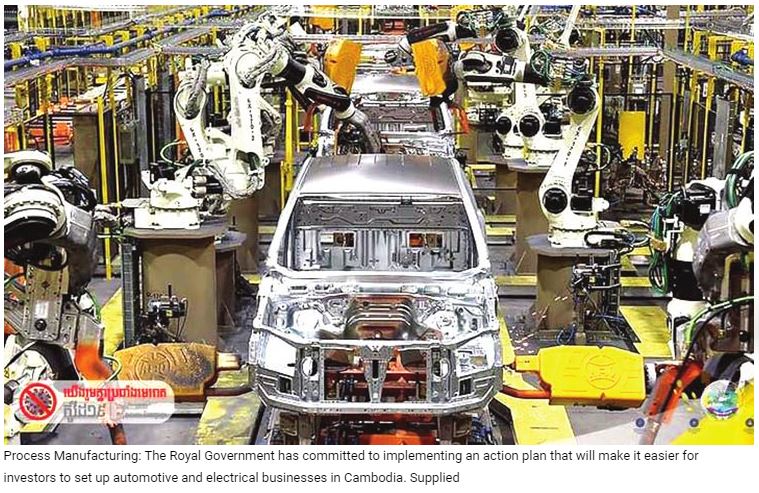Cambodia: Auto, electrical biz to boost value chain positions
The Royal Government of Cambodia has committed to implementing a comprehensive cross-ministerial action plan that will make it easier for investors to set up automotive and electrical businesses in Cambodia and increase the cost-competitiveness of their operations.
Cambodia’s goal will be to move up the value chain into more complex and higher value-added components in the automotive and electrical manufacturing sectors, Cambodia Chamber of Commerce (CCC) vice-president Lim Heng said.
“The government is encouraging the use of environmentally-friendly vehicles, such as electric ones. This roadmap will provide the wherewithal for connectivity to local and global value chains, and enable Cambodia to shift to higher-value chain positions,” Heng said.
The announcement follows 2019 data from the World Bank suggesting that the Kingdom is ready to advance its manufacturing industries and climb further up the Global Value Chain (GVC) ladder.
“While Cambodia has seen rapid growth in limited manufacturing GVCs for many years, particularly garments and footwear, the country has not yet transitioned to the next stage of GVC participation of advanced manufacturing and services. Examples of such stages of participation are motor vehicles parts and components, electronics assembly, medical devices manufacturing, and the services segments of value chains such as design or marketing and branding,” Heng pointed out.
Over the next decade, Cambodia aims to become an Automotive component manufacturing hub, making a wide range of low-to-medium complexity components for export. A more mature components ecosystem will also allow Cambodia to scale up four-wheeler assembly in the future.
In the near term, however, Cambodia will focus on the ongoing opportunity to grow the manufacturing of simpler, more labour-intensive automotive components for export (e.g., wiring harnesses, seats and simpler electronic and electrical components), while increasing backward linkages for locally assembled two-wheelers.
This approach takes maximum advantage of Cambodia’s current competitive benefits, such as cost-competitive labour, and its strategic location close to fast-growing automotive assembly hubs in Thailand and Vietnam.
In recent years, through a partnership with the private sector, the sector has grown rapidly, with automotive component exports more than tripling from $60 million in 2015 to $200 million in 2019. The government is committing to further developing this sector, driving Cambodia’s economic recovery and long-term growth, and moving the economy towards skills-driven industry and integration into regional value chains, in line with the Industrial Development Policy 2015-2025.
Cambodian-based research analyst and author of “Connecting Cambodia’s SMEs to Regional Value Chains: The ‘Bridging Gap’ and ‘Missing Link’”, Sok Kha, told Khmer Times about the future of global supply chain integration for Cambodia.
“Advancing trade agreement negotiations and signing open new markets opportunities for Cambodian businesses, but relying on inexpensive labour, task repetitive manufacturing, and preferential trade treatments will eventually become a thing of the past.
“The rapid technological and digital advancement will only make the global value chains borderless, and thus requires both the public and business sectors in Cambodia to be able to embrace this new trend.
“This will mean a need to increase the capability to digitise the production, business operation, and cross-border trade-related processes, which does not sound gloomy given the country has a young, growing population of entrepreneurs and digital natives. Still, we must ‘leapfrog’,” Kha added.
Source: https://www.khmertimeskh.com/501048793/auto-electrical-biz-to-boost-value-chain-positions/


 English
English




